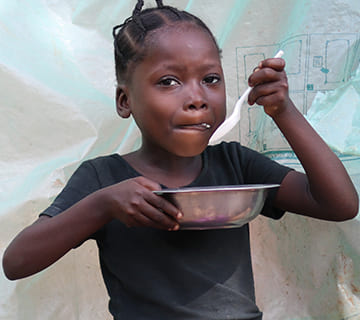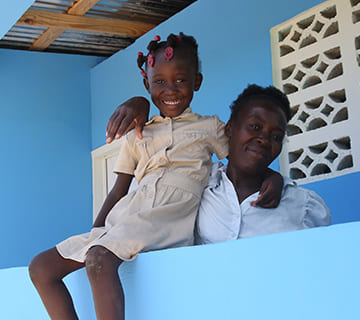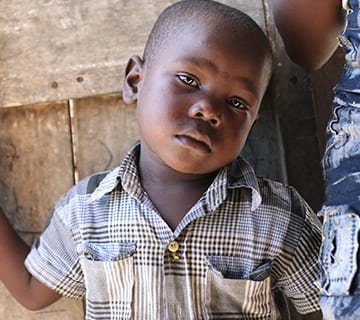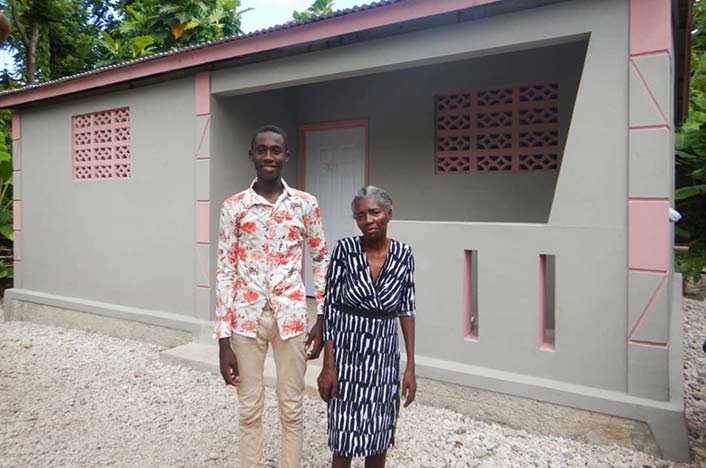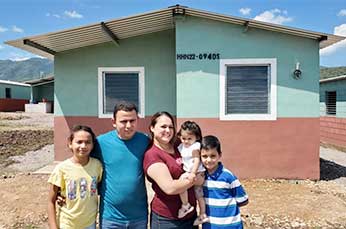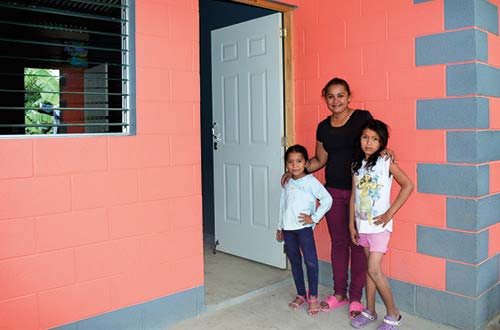
How We Help
Food For The Poor helps provide lifesaving homeownership.
- In 2023, 1,479 safe & secure homes built
What Is Unsafe Housing?
Out of necessity, housing in developing countries is makeshift and temporary for many people living in poverty. According to the Inter-American Development Bank, about 50 percent of people in the Caribbean and Latin America do not have an adequate home and live in precarious houses not built to last.
Some extremely impoverished families in the Caribbean and Latin America migrate from rural areas into more urban settings to find steady work and a better life.
But what most find when they arrive is unsettling. Jobs are not easy to get, school costs for their children are expensive, food prices are higher and without an income, they cannot rent a place to live, so they become homeless or squat in an unhealthy and dangerous area.
Good, hardworking people suddenly find themselves crushed by extreme poverty.
And then, there are impoverished people living in rural communities that generations of their families lived in before them. They have lived in extreme poverty their entire lives and their homes are built from scraps of wood, zinc and any other materials they can find.
Safe housing is a human right. When a family has a safe place to live, parents can leave their children and look for work to support their family so they can live a healthy and stable life.
Informal and unsafe living
Informal and run-down neighborhoods settled outside of planned cities are home to the most vulnerable people. These neighborhoods are usually overcrowded, which means contagious diseases spread quickly, and harsh living conditions are unavoidable.
Because local governments do not recognize these neighborhoods, residents live without electricity, water, emergency services, sanitation, health care and other vital services.
What does a safe home mean?
A safe home means that a family lives together with stability, knowing that they own their home. They have strength because they sleep through the night without worrying about their safety. They have self-reliance because they no longer rely on others for safe shelter.
Let’s look at a few of the significant problems faced in an unsafe home:
Health Issues: At some point, everyone in a poorly built home will get sick. Most homes have an indoor adobe oven or a type of fire to cook over. The smoke causes respiratory problems. Wet floors and roof leaks in heavy rain cause colds, fevers and worse.
Structural Issues: Homes are typically built from collected scraps of zinc, wood, plastic bags, or mud-and-stick construction. The roofs leak during heavy rains in poorly structured homes. In addition, the floors are dirt, which means in the dry months, dust causes respiratory problems, and in the rainy season, flooded homes foster mold growth and mosquitoes swarm puddles.
Security Issues: Many homes don’t have a proper door. Sometimes, it’s a wood plank with some wire as a “lock.” Sometimes, there is no door. Instead, an old bedsheet hangs over an opening to the house. No one is safe inside.
Natural Disasters: Not only is an unsafe home likely to collapse during a natural disaster but when families living in extreme poverty lose the only shelter they have, they are hit hard and will not be able to rebuild without help.
Home sweet home
Food For The Poor builds homes for families in the countries where we serve, and one of the critical considerations in planning construction is input from the family.
Builders assess the family’s needs, climate and materials that can be bought locally, stimulating the local economy.
Lifechanging homeownership
In most countries where FFTP serves when an FFTP home is built, the matriarch – the female head of household – is given the legal rights to the land and the home.
In-country staff work with the matriarch to file the appropriate paperwork to legally own the home that is built for them.
In most countries where FFTP builds homes the matriarch is given legal homeownership because culturally, many communities do not empower women as home or landowners, but many women are the sole head of their households.
For example, in many countries, women are especially vulnerable to losing their homes, particularly if the male head of household dies, because gender-biased laws prevent women from owning property.
Securing their home and land rights allows women to give their families long-lasting freedom and stability for generations. For a widow and mother like Maritane in Haiti, a new home saved her family.
Unsafe living since the 2010 Haiti earthquake
Sixteen-month-old Agnes, 3-year-old Jean-Benoit and 5-year-old Marie Raphaelle lived with their mother, Maritane, in a tiny, dark shack. They were all afraid of the dark, and they had plenty of reasons to feel that way. Animals, huge spiders as big as crabs and poisonous snakes invaded their home at night and tried to bite the sleeping family.
Living high atop a mountain in western Haiti, Maritane, a widowed mother, struggled daily to provide for her children. The A-frame hut they lived in provided Maritane and her children little protection from intruders and was as hot as an oven during the day.
Still, Maritane’s faith was greater than her suffering – she knew God heard her prayers. She said the Lord was with her on her daily walks to fetch water far from her home and when she went to the village to beg for food. Those trips took her across the mountainside where she stepped carefully over crumbling rock and jungle terrain. Maritane knew God was getting her family by. “If I didn’t have God, I wouldn’t live,” she said.
Maritane moved to this desolate area to start her married life. She and her husband used to live in a different shack, but it fell apart during the January 2010 earthquake. Together, they salvaged metal scraps to form a triangle-shaped structure. She and her husband didn’t have the means to improve the hut’s dirt floor or build walls and doors to protect their family.
Sadly, a few years after moving into the hut, her husband died, and Maritane was left alone.
Safe living with a new home
Because of the generosity of Food For The Poor donors and friends, Maritane received an FFTP home and it changed her life and the future of her children.
Why sponsor a Food For The Poor Home?
Each FFTP home is built with sanitation, a water component, a ventilated cooking area, a sink, furnishings and lighting.
Having water, a sink and an indoor toilet improves a family’s overall hygiene and cuts down on the spread of germs.
Furnishings like a table, chairs and beds give families a fresh start and a place to gather for meals and for children to do their homework. And with the added feature of lighting, children can work on their studies at a table after the sun goes down.
An FFTP home brings a family together and gives them a new beginning. Home becomes a haven instead of a place that threatens the lives of those living there.
You can provide peace
Build a solid home for $12,300 and move an impoverished family from a substandard living situation to a bright, comfortable future.
FFTP-built homes are constructed to stand up to the harsh elements of the Caribbean and Latin America. For families who have only known fear and suffering from living in a makeshift shack or even a tent, these homes provide a life-changing lift out of poverty.
As followers of the gospel of Christ, we are not comfortable witnessing our brothers and sisters living in dangerous and non-dignified homes.
Christ’s words lead the mission at FFTP: “Whatever you did for one of the least of these brothers and sisters of Mine, you did for Me.” (Matthew 25:40, NIV) Jesus didn’t say those words as a suggestion.
But as Christians, His words mark a lifelong commitment to share God’s love with the world, especially those who need us most.
Praise in the valley
Many of the blessed recipients of the generosity and sacrifice of donors reveal that they prayed – some for decades – that the Lord would notice them.
For example, a grandmother in Guatemala once shared that her mother had prayed for God to improve her family’s impoverished and challenging situation.
Three generations of women in one family collectively prayed for decades, asking the Lord to change their circumstances.
They waited in faith for a miracle. And one day, a donor like you felt called by the Lord to lend a hand and transform their lives forever. Now, they have a place to call home.
Transform a life forever
Millions of families living in extreme poverty constantly fear their fragile shelter will topple on them as they sleep, worry about having a flooded home and dread the prospect of intruders breaking in and harming their children. But they are trapped in a cycle of poverty and cannot afford a better home.
Since its inception 40 years ago, FFTP has built more than 92,000 homes that have transformed the lives of families throughout the Caribbean and Latin America.
Change a life today by prayerfully considering a gift to build a home. Your sacrifice gives a family a place where they can rest in safety and security, without worry.
For the first time in years, a family with a new home can get a whole night’s sleep, wake up refreshed and be ready to handle the challenges of their day as they strive to build a better future.
Thank you for your prayers, your generosity and for embracing the burdens of our brothers and sisters in need, just as Christ did. Your gift for a home will transform a life.
Other Ways to Give
